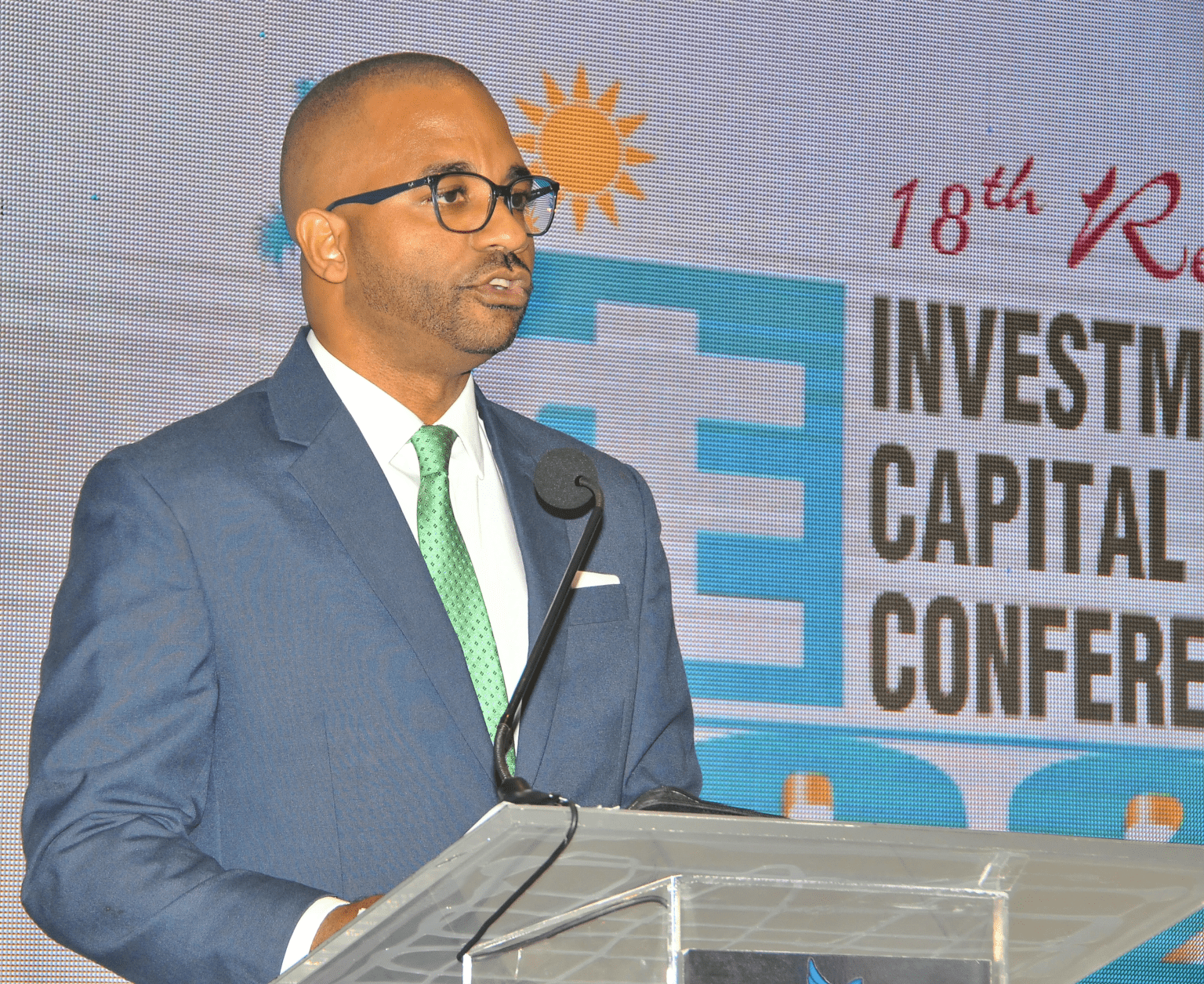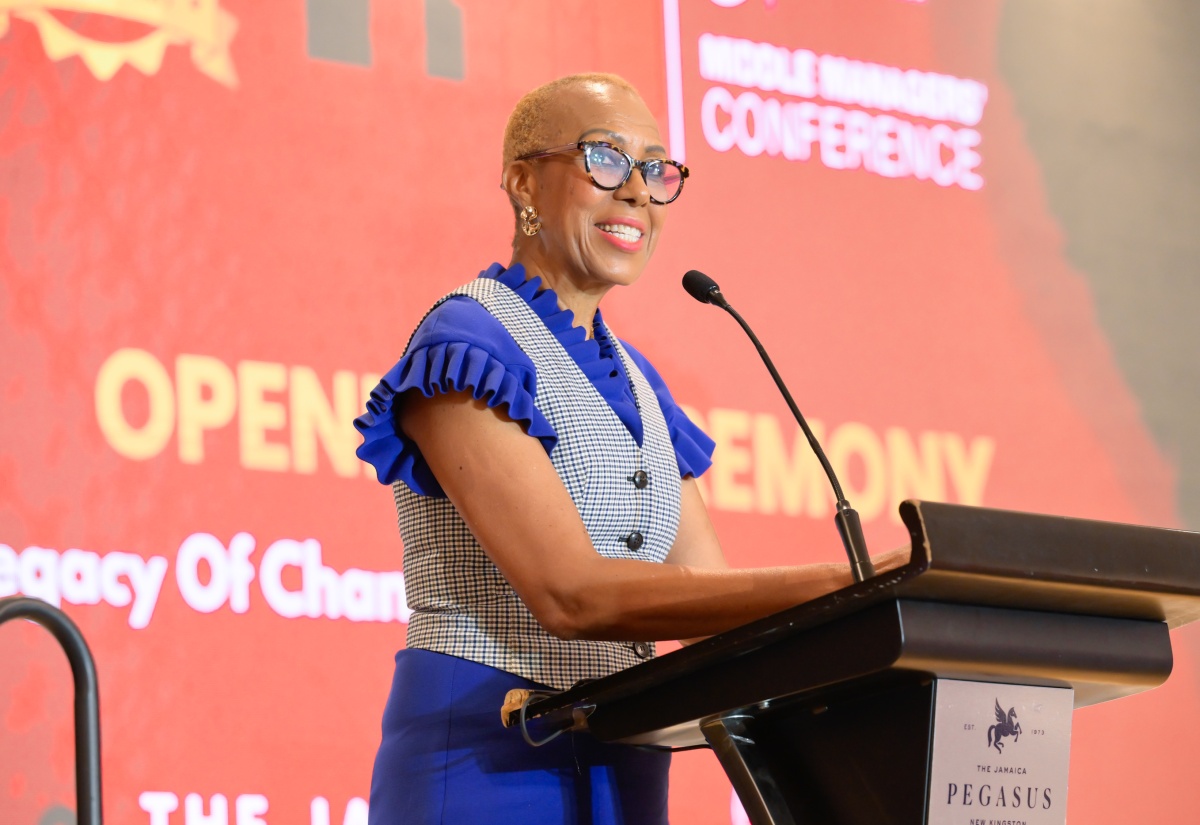Leadership Conversations
Revival Of The Entrepreneurial Spirit And The Redefinition Of The Capital Markets
Published
2 years agoon

NCB Capital Markets is proud to be associated with the JSE’s annual conference for a 7th consecutive year as the lead regional sponsor. This year’s theme the “Capital Markets Redefined Achieving the Impossible” is very relevant given the global events over the past 3 years and the trends we are seeing globally, locally and I dare say regionally.
Tonight I had planned to speak on the Revival of the Entrepreneurial Spirit and the Redefinition of the capital markets…and I still will. Entrepreneurship is the engine of any economy and the capital market plays an important role in fueling that engine. I will explore the Jamaican experience and identify the lessons, which are applicable not just for Jamaica, but to the wider region as well.
However, it would be remiss of me, bordering on irresponsible, not to use this platform, as President of the Jamaica Dealers Securities Dealers Association (JSDA), to speak on the topic that is now dominating the local press. I was expecting 2023 to be a year of reprieve for the industry, having weathered the COVID-19 pandemic and the inflation crisis over the last three years. But, here we are with our own local situation, one that is threatening the reputation of our securities industry and public confidence in the financial system. As such, I will also address this in my presentation.
In the midst of this ordeal, I chose to keep my speech focused on the revival of the entrepreneurial spirit because while we as a nation solidify the transparency and security of our financial markets to rebuild confidence, the need for stronger economic growth, enhanced competitiveness, and greater job creation still exists.
A strong financial system is a key enabler of a thriving economy, which creates a high standard of living and quality of life for citizens. With that still being a goal, we must then ensure that financial markets can continue to play its role of providing resources for the innovative and productive ideas that will fuel development.
ENTREPRENEURSHIP
To start our conversation let’s look at the benefit of entrepreneurship to the economy; and I am going to focus on 3 benefits:
Firstly, entrepreneurship improves productivity as it injects the economy with a fresh batch of higher productivity firms. As such, it increases competition among existing businesses, and pushes out less-productive ones.
Secondly, entrepreneurship spurs innovation as new firms are disproportionately responsible for commercializing new innovations, particularly radical innovations that spawn entirely new markets or substantially disrupt existing markets.
Lastly, Entrepreneurship creates jobs as new and young businesses are the engine of net job creation in the economy.
LOCAL FINANCIAL CRISIS
In looking at the culture of entrepreneurship in Jamaica and how it has evolved, I am going to take us back three decades to a dark period in our economic history, that is, the financial sector crisis of the 90s. I believe it important that we understand the impact it has had on the psyche of our citizens, and what it did to the local entrepreneurial mindset.
In the early 1990s, in response to rapid depreciation in the local currency and spiraling inflation that had risen to as high as 80%, the government and the central bank sought to stabilize the economy and the exchange rate by pursuing a high- interest rate policy.
This high-interest rate policy played a meaningful role in the financial crisis of the 1990s and in subduing the entrepreneurial spirit because the interest rates at which banks lent to borrowers rose to prohibitively high levels. As the government raised interest rates to reduce liquidity in the economy, commercial banks quickly raised the rates at which they lent money to businesses.
According to BOJ data, the average lending rate for commercial banks rose from 34.5% in 1990 to 62.3% in 1994. As a matter of fact, in early 1994, a survey conducted by the Financial Gleaner revealed that banks such as Century National Bank, Jamaica Citizens Bank and Worker’s Bank were lending at rates that were as high as 65%-69% per annum.
The fallout from the financial crisis truly stifled entrepreneurship for two generations. Many businesses failed, with some entrepreneurs owing money to this day. The non-performing loans in the sector at the time accounted for 24.9% of GDP compared to the average of 1.2% over the last 5 years.
Allow me to paint a picture for you, an illustration… imagine an entrepreneur with a 15-year commercial (or residential) mortgage with a debt servicing ratio of 1.25 times, implying he has a 25% cash flow buffer to support loan payments. Let’s say that facility has a loan to value of 80%. A 20 percentage points interest rate rise, similar to what would happened in the 90s, would result in a cost of debt increase of approximately 70%…decimating his cash flows. He would likely be forever debt riddled because the recoverable value of the underlying collateral would likely be below the loan amount because of likely systemic fallout in the system.
The environment effectively killed the entrepreneurial spirit, as additionally, those that were fortunate to have liquidity opted for the easy route of placing money on fixed income securities earning high/double digit interest rates. In retrospect, one cannot blame them. Why take on the hassle and risks of running a business when your alternative is earning north of 30% per annum in relatively low risk fixed income investments?
That experience did not just kill a generation of entrepreneurs, it created a mindset of conservatism for years to come. The subsequent generation – my generation – which was either in the secondary or tertiary education system at the time, developed a conservative mindset.
The modus operandi of that generation was to do well in school so that you could land a job with a blue-chip company; preferably a firm that had international backing. Working for a small company was undesirable, becoming an entrepreneur was a no no. Entrepreneurship was a bad word and viewed as being for those that couldn’t get the desirable jobs at the time. In aggregate, I would argue, the outcomes of that period have stifled the economy for approximately two and half decades.
CURRENT ENVIRONMENT
With average GDP growth of 1.4% since Independence 60 years ago, our economy has endured some challenging times. It is these times and a spirit of flexibility/adaptability that makes us the resilient country that we are. The much needed macro-economic stability driven by reforms coming out of the more than a decade-old IMF agreement, coupled with financial sector innovation, is once again spurring entrepreneurship.
So we are we seeing today:
– many of the bright creative minds leaving the education system having the pursuit of entrepreneurship on their career roadmap. This is also reflected in the listing of a number of junior market companies controlled by individuals in their sub 40s.
– the emergence of a private equity culture, which has been enabled by the successes of our junior market and other financial innovation.
– the stock market, especially the junior market, being an avenue for entrepreneurs to raise funding to scale their operations.
– with lower interest rates and improved macroeconomic fundamentals, a lot of the so called “old money” are looking at private equity opportunities, in support of entrepreneurism, to diversify and create wealth.
The trend we are seeing currently, shouldn’t be taken lightly and must be nurtured for us to truly experience the transformation that we need as a country and deserve as a people. Jerry Moran, an American lawyer and politician, notes that “Innovation and entrepreneurship are the opportunity and best opportunity we have to grow the economy.”
RECOMMENDATIONS
With an ever changing global landscape and the accelerated pace of globalization, developing countries are at risk of seeing an increase in income inequality given changes in trade, technology and employment patterns. The last three years have seen an acceleration of these changes.
What is clear in my mind is that countries like ours must either adapt or face the consequence of being left behind. Doing nothing is not an option. With our resilience, improving macro-economic fundamentals and a renewed entrepreneurial drive, supported by an innovative financial sector, there is an opportunity to transform our economy and be on a path of a much higher rate of economic growth.
I want to share with you three themes that will be important to our success as a nation. They are:
– Identifying and leveraging competitive advantages;
– Seeking scale;
– Creating and retaining talent.
Identifying and leveraging competitive advantages
The manufacturing of goods and provision of services are becoming increasingly competitive, driven largely by technological change and scale. We have seen it play in front of our eyes: industries that were growing at phenomenal rates a few decades ago are now dead, or at best, are on life support. Travel agencies and anything print- from photos to newspapers and magazines are all becoming obsolete and are just a few examples of the disruption that is ongoing. Even our own financial services industry is being disrupted by technology, with the advances in mobile, internet and ABMs, heavily staffed banking and customer-facing financial services operations are becoming a thing of the past.
Therefore, to remain relevant, as a country we need to take some tough decisions and determine where our competitive advantages lie and what we need to focus on to transform our economy and the lives of our citizenry. Countries like Singapore, Panama and China have taken bold steps, focused on their competitive advantages and have been reaping the benefits.
At home, I often ask myself the question, why is it that the two industries that Jamaica is most known for, are among the most underinvested industries in Jamaica. Globally, Jamaica is known for track and field. Where that sport is concerned, we are to the world what Brazil is to football. Why then is Sports not a major contributor to GDP? Why are the major track and field events held in Europe and not in Jamaica?
Likewise, Jamaica is world renowned for reggae music. So why is it that so many reggae festivals are held in Europe and elsewhere but not in Jamaica? Kingston, Jamaica should be to Reggae, what Nashville Tennessee is to country music.
These are both industries that have the potential to dramatically impact the citizenry at the grass root. With focus and investment, they can ultimately help to create opportunities for economic growth, employment, and aid in addressing income inequality and by extension, some of the social ills of this country.
I actually had a dream about this. I dreamt that Jamaica in 2045 was the leading destination for global athletes, entertainers and those in the creatives, to hone their craft, live and vacation. In my dream, Jamaica’s international financial center initiative had allowed us to become the leading wealth management hub for world’s most famous athletes, irrespective of sport, and all the world’s largest wealth management firms were domiciled here.
Finding those niches and committing to them can result in transformation at scale, which takes me to the next theme, which is seeking Scale.
Scale
Jamaica has a population of 3 million people. The world population is just under 8 billion people. With globalization, enabled by technology, there is unprecedented access to a market that is almost three thousand times that of our own.
However, to be a meaningful global player, it is always better to do it as a collective. The population of the English Caribbean is twice the size of Jamaica at 6 million people. If you consider the entire Caribbean, we are speaking of a population of 44 million, which is a decent size. Collectively that is larger than the Canadian population, almost as large as Spain’s and two thirds the size of the United Kingdom.
As a collective, we have enough similarities and differences to make us a potent force on a global level. I am encouraged by the work being done by the Caribbean Private Sector Organization (CPSO), whose Agenda is that of supporting the full implementation of the CARICOM Single Market and Economy (CSME) and advancing Private Sector priorities in the Caribbean Community.
One of the recent initiatives of the CPSO is to bring together the regional capital markets. A topic that is back on the front burner, and I note Dr. Street-Forrest’s remarks earlier and that discussions also took place at the Trinidad & Tobago Stock Exchange’s conference in October last year. A notion of a regional exchange and/or market have been on the table for years; however, the relevance of such a construct couldn’t be more timely.
Talent
And finally, on the matter of the theme of talent – one of the biggest challenges post-pandemic is the global labor shortage and the prevalence of remote work. There are two aspects of this conversation. There is ensuring that we have the right competencies to take our economy to the next level; then there is the retention of same because being able to retain talent is just as important to our success as creating it.
The global shortage of labour in critical job functions poses a significant threat to countries like Jamaica that is large and sophisticated enough to be a hunting ground for talent. Historically, talent has migrated to other countries for more attractive compensation. With the increasing prevalence of remote work, we are now seeing international firms offering local talent attractive job opportunities, with them not having to migrate. The next effect of this is greater talent scarcity and upward pressure on wages, which can be problematic for businesses that can’t scale. This is a real threat that is not going away. As such, we not only just need to be aware of it, we need to convert it into an opportunity.
To benefit from the developments in the global economy and truly transform our economy, it is clear that Jamaica, and I dare say the region, cannot maintain the current status quo. In Jamaica, after taking a hit during the financial crisis of the 1990s, we are now seeing the revival of the entrepreneurial spirit aided by relatively low interest rates and financial innovation that has both reduced the cost of capital and increased the types of capital that is available.
However, given the trends that we are seeing in the international marketplace, to take advantage of this revival and the innovation that we are seeing in the financial services industry, we need to focus on these three themes – identifying and leveraging our competitive advantages, seeking scale and creating and retaining talent. I believe, ladies and gentlemen, that these three themes are the keys to the economic transformation we seek.
MULTI-BILLION DOLLAR FRAUD
Now shifting gears, to what has been making the daily headlines recently – the alleged multibillion occupational fraud that occurred at a securities firm in Jamaica. The incident is of grave concern to us as an industry. It is painful and heartbreaking, and unfortunately, it has set us back as a financial sector.
This incident, which is threatening confidence in the financial sector, does not reflect the state nor conduct of the securities industry as a whole. While fraud will never disappear, fraud of the magnitude that has been alleged, would not happen at a firm with a strong, well-functioning governance framework. In this instance, based on what is in the media, there appears to have been a significant break down in controls and governance.
The industry, as we know it today, has been around for almost three decades having withstood:
– The 2008 global financial crisis;
– The 2010 and 2013 local debt exchanges; and
– The fallout associated with the global pandemic, and more recently, the inflation crisis.
In all instances, during that period, the sector remained resilient, supported by ample capital and liquidity, with no systemic or entity failures. We are the same industry that has been noted for innovation and that has put Jamaica on the global map.
Our industry is plugged into the international markets, having adopted best practices in terms of processes, controls and governance. We are talking about world class settlement and custody platforms, and frameworks, driven by the use of best in class technology. All these technologies reduce the need for human intervention and as such reduces fraud. As such, it is not a surprise that historically, fraud in the sector is minimal.
The alleged incident is unfortunate; however, I cannot overemphasize that as individual firms and as a collective, we take fraud seriously and are against any activity that undermines the credibility of and confidence in the sector.
The Minister of Finance, the Dr. the Hon Nigel Clarke, at his press conference held yesterday, outlined sweeping changes to come, which includes the creation of a single regulator for prudential supervision; a role which is to be ultimately assumed by the central bank.
The JSDA supports actions geared towards restoring confidence in the securities market, as this is needed for us to the continue the contributions that the industry has been making over the past decade plus in building wealth for Jamaicans and providing capital to support the growth of businesses, the transformation of industries and the expansion of the Jamaican economy.
As an industry, our focus will now be on helping to restore public confidence and active engagement of the authorities during the consultation process over the next several months, as they seek to craft the new regulatory framework. This consultation process is critical as we seek to ensure that the outcome results in a healthy balance between prudential monitoring and that of continued market development and deepening.
There is a global market view that bank regulators are typically overly conservative, which is not necessarily supportive of the entrepreneurial underpinnings of the securities market which thrives on innovation, necessarily set within the context of prudent risk management. This is unlike a securities regulator that tends to facilitates market deepening and innovation, within the same context. Our fears, exist in this regard.
However, I can say the fear now is less than say a decade ago, as we are seeing a central bank that is much more market friendly. As such, I am cautiously optimistic that once we get pass the teething pains, we will establish a framework that consists of a robust regulatory oversight, that restores confidence in the sector, but also one that facilitates us achieving our aspiration of being the global niche player in financial services that we have the potential to become.
NCB CAPITAL MARKETS INITIATIVES
Prior to closing, as is customary, I will share a bit about what we have been doing at NCB.
i) GoIPO bond portal
In 2019, NCB Capital Markets pioneered the region’s first paperless end- to-end automated IPO solution called GoIPO. This platform allows investors to participate in equities public offerings and open accounts from the comfort of their homes or mobile devices.
In the coming weeks, we will be launching our GoIPO bond portal. This innovation will allow investors, not just our clients, a digital-first investment experience when investing in local Bond Offers, both public and private.
Available on the GoIPO platform, investors can view all transaction documents for a bond or note offer, digitally. They can complete their bond applications online and submit their accredited investor declarations. Clients will be able to add joint holders and submit their principal, coupon payments, and refund mandate, as well as choose how they would like to fund the transaction. Clients’ JCSD account information will be validated for accuracy to prevent the submission of incorrect data. The entire application process can be completed in less than ten (10) minutes.
Once investors submit their applications they will receive an order confirmation email, with the details of their order, and a follow-up email will be delivered indicating whether their application has been successful.
For all applications that are approved, GoIPO will generate a PDF version of the executed Bond/Note Purchase agreement that will be digitally stamped with the Tax Authority of Jamaica seal. All generated agreements will be attached to the approval email that clients will receive once the offer closes and allocations are complete.
With this innovation, investors can now have the same seamless investment experience when participating in bond offers, that they have come to know and expect for equity transactions.
ii) Continue our initiative with no fees for Junior Market IPOs
As a leading market maker and originator of transactions that span the entire spectrum of the capital structure in Jamaica and the wider Caribbean, we continue to improve and expand how we operate in the equity markets. We also continue to redouble our efforts in engaging our community of companies with private equity investments. Let’s elaborate on those two points, starting with the Junior market.
This year, NCB Capital Markets will resume waiving its arranger fees for companies that have engaged us to list on the JSE junior market. We see this strategy as key for unlocking economic growth by giving companies easier access to the capital markets.
As for private equity, NCB Capital Markets as well as our off-balance sheet platform, Stratus, is committed to supporting promising private companies that might not yet be ready to go public, by making equity investments.
We also provide coaching and strategic advice so that these companies are in a better position to go public in the future. Not being ready for listing does not mean that a company should not be able to access equity capital, and we are prepared to work with companies that are early in their life cycle, but that require equity today.
iii) Guyana entry
Late last year, we opened the doors of NCB Capital Markets (Guyana) Inc. as an advisory firm and now await our securities licence, which will allow us to arrange and deal in securities locally.
The pace, steepness and exponential nature of what is taking place in Guyana is a tremendous opportunity for Guyanese. To benefit, the Guyanese have to access the right scale and type of financing that can navigate fast-paced, commodity-based environment.
The Guyanese will need access to financing at each layer of the capital structure and in scales that single institutions may be prohibited by regulation from taking on their own.
NCB Capital Markets has been working in Guyana since 2014. In recent times we have executed structured finance-type transactions that set the stage for further development of Guyana’s domestic capital markets by enabling external flows of capital into Guyana.
With this, investors both inside and outside Guyana, can gain access to attractive investment opportunities and Guyanese businesses can gain access to a range of financing solutions, including private and public debt; senior, unsecured and mezzanine type syndicated debt; quasi debt and quasi equity; alternative asset type class financing; factoring private credit, etc.
Additionally, the people of Guyana can now gain access to investments created by the capital markets within best practices corporate governance and risk management frameworks and a regulated environment. This has the potential to redefine investment options and access for the people of Guyana and provide investment opportunities to investors across the region.
CLOSING
In closing, the linkage between entrepreneurship and the capital markets is evident. While we work to restore confidence, strengthen prudential regulations and continue to support the development of the capital markets, it is equally important that we are conscious of the global trends and our competitive advantages in creating policies and business strategies. Let’s protect the entrepreneurial spirit. The impact of huge negative shocks can have long, lasting effects that can take generations to undo.
Ladies and gentlemen, thank you for your continued interest in the JSE conference and by extension the development of the regional capital markets. I wish for you an informative and productive next 2 days.
Thank you.
Mr. Steven Gooden, CEO, NCB Capital Markets Ltd. addressed the opening night of the JSE Conference on the topic: “Revival of the Entrepreneurial Spirit and the Redefinition of the Capital Markets”.
You may like
-


The Strategic Importance of Investor Communication and Recommendations for Caribbean Listed Companies
-


JSE to Launch Micro Market in April 2026
-


JSE launches Green Bond Plus Platform
-


The Smart Way to Invest
-


Can Investing Solve Climate Change?
-


The LAB’s Strategic Shift: Embracing Content Creation Amidst Evolving Financial Landscape
Business Insights
Businessuite Cover Story: Too Much Power? Governance Risks Rise as Tyrone Wilson Consolidates Leadership at Kintyre and Visual Vibe
Introducing a non-executive Chair, appointing dedicated executives for strategic verticals, and strengthening board committees are proven routes to balancing entrepreneurial dynamism with fiduciary responsibility.
Published
2 days agoon
July 1, 2025
• Mr. Tyrone Wilson, who currently serves as Chairman, President & CEO of Kintyre Holdings (JA) Limited, and Chairman of Visual Vibe, has formally assumed the additional role of Chief Executive Officer of Visual Vibe, a wholly owned subsidiary of the Company.
• Ms. Jasmin Aslan has been appointed as Chief Business Officer (CBO) of Kintyre Holdings (JA) Limited, effective July 1, 2025.
• Mr. Andrew Wildish has resigned from his role as Chief Investment Officer of Kintyre Holdings (JA) Limited, effective June 30, 2025. The Company’s investment strategy will now be assumed by Chairman, President & CEO Tyrone Wilson, and will be supported by the Investment Committee of the Board, chaired by Mr. Nick Rowles-Davies.
 When Mr. Tyrone Wilson, Chairman, President, and CEO of Kintyre Holdings (JA) Limited, stepped into the additional role of Chief Executive Officer at Visual Vibe—alongside his existing portfolio—industry observers took note. His move, following the resignation of Chief Investment Officer Andrew Wildish, now consolidates strategic, operational, and governance control under one leader across the two connected companies.
When Mr. Tyrone Wilson, Chairman, President, and CEO of Kintyre Holdings (JA) Limited, stepped into the additional role of Chief Executive Officer at Visual Vibe—alongside his existing portfolio—industry observers took note. His move, following the resignation of Chief Investment Officer Andrew Wildish, now consolidates strategic, operational, and governance control under one leader across the two connected companies.
While some argue that this concentration of power streamlines decision-making, particularly in smaller or fast-moving firms, global governance standards paint a starkly different picture.
From the UK’s Cadbury Code to the OECD and US Dodd-Frank regulations, best practice guidelines consistently recommend separating the roles of Board Chair and CEO. The rationale is simple: independent oversight safeguards shareholders by ensuring that strategic decisions, executive compensation, and performance evaluations are objectively scrutinized. Harvard Law’s corporate governance research found that dual-role companies often pay more to their top executives and face elevated ESG and accounting risks, with lower long-term returns to shareholders.
In Mr. Wilson’s case, the risks are amplified by his assumption of the departed CIO’s investment strategy responsibilities. While an Investment Committee chaired by Mr. Nick Rowles-Davies will provide support, the absence of a dedicated CIO raises questions about execution bandwidth, focus, and strategic continuity.
His move, following the resignation of Chief Investment Officer Andrew Wildish, now consolidates strategic, operational, and governance control under one leader across the two connected companies.
Recent global examples demonstrate the potential fallout:
At Boeing, CEO Dennis Muilenburg’s dual role contributed to oversight failures during the 737 MAX crisis.
Starbucks faced shareholder pressure to separate Chair and CEO roles held by Kevin Johnson and later Laxman Narasimhan.
At Volkswagen, Oliver Blume’s simultaneous leadership of VW Group and Porsche raised warnings of strategic drift and governance conflict.
For shareholders, these scenarios underline a core truth: Checks and balances matter. Without an independent Chair to challenge decisions, or a standalone CEO focused solely on operational delivery, companies risk poor accountability, strategic blind spots, and diminished investor confidence.
Furthermore, frequent senior departures, as seen with Wildish’s exit, create instability, potentially eroding morale, institutional knowledge, and external credibility. For companies like Kintyre and Visual Vibe, operating in competitive markets requiring agile yet well-governed leadership, the tension between efficiency and accountability has never been more stark.
The path forward? Independent governance experts recommend immediate board-level evaluation of leadership structures to ensure robust oversight. Introducing a non-executive Chair, appointing dedicated executives for strategic verticals, and strengthening board committees are proven routes to balancing entrepreneurial dynamism with fiduciary responsibility.
At the heart of it all lies a question shareholders must ask: When one person wears too many hats, who holds them accountable?
Foot Notes
Governance Best Practices: CEO & Chair Separation
Independence & Oversight
– Combining CEO and Chair roles concentrates power in one person, weakening board oversight and independent challenge
– Governance codes worldwide (UK Cadbury, OECD, Dodd-Frank, etc.) recommend separate roles to avoid conflicts of interest and boost board independence
Costs & Performance
– Studies show companies with dual roles tend to pay more to the leader, exhibit higher ESG and accounting risks, and often deliver lower long‑term returns
Efficiency vs. Accountability
– Proponents argue unified leadership can streamline decision-making, especially in small, fast-moving or crisis settings
– Critics note that efficiency gains are outweighed by weakened accountability, less board challenge, and riskier executive decisions
Risks of Tyrone Wilson Holding Multiple Executive Roles
1. Conflict of Interest & Oversight Blind Spots
As CEO, President, and Board Chair of Kintyre, plus CEO of Visual Vibe, Mr. Wilson controls operational, strategic, and governance levers. This vertical integration drastically reduces independent oversight.
As BoardEvals points out, the Chair should be able to “challenge the CEO’s performance”—impossible when they’re the same person
2. Governance and Shareholder Accountability
– The Board’s duties include setting senior pay and evaluating leadership. With a unified Chair/CEO, Mr. Wilson effectively oversees his own compensation and reviews—undermining fiduciary trust
– Transparency risks arise if disclosures and rationale for dual roles aren’t clearly communicated to shareholders, as required under Dodd‑Frank §972 .
3. Execution Risk & Burnout
Fulfilling multiple demanding roles reduces bandwidth and focus. There’s evidence dual roles can dilute effectiveness and increase error risk .
4. Investor Confidence & Market Perception
– Majority of global investors favor role separation. Even large US firms are moving in that direction (44% of S&P 500 now combined vs. 57% a decade ago)
– Cases like VW (Blume), Starbucks (Niccol), Boeing (Muilenburg) show shareholders raising flags when executives take on both roles
Executive Departures & Instability
Andrew Wildish’s departure as CIO on June 30, replaced by Mr. Wilson & an Investment Committee, indicates a consolidation of high-level roles. Multiple senior exits can signal:
Leadership instability, undermining investor confidence and organizational clarity.
Strategic drift, especially in areas requiring specialized expertise.
Increased “agency” and “entrenchment” risk – where board oversight may be compromised by concentrated executive power .
Shareholder Considerations
Investors should be concerned when:
Checks and balances are diminished
With one executive occupying so many strategic and governance roles, board objectivity may be compromised.
Succession and crisis management are jeopardized
Who leads if Mr. Wilson is unavailable? What happens if rapid decisions are needed? Lack of emergency backup risks business continuity.
Specialized oversight is reduced
Investment strategy, compliance, audit—all risk oversight gaps when not handled by dedicated, independent executives.
External advisors step in
If retained, external governors may mitigate some risks—but at added cost and complexity.
Entrepreneurship
Building a Business While Working a 9–5: The Real Hustle Behind the Dream
Published
1 week agoon
June 26, 2025
Starting a new business is bold. Starting one while managing a full-time 9–5? That’s a different kind of brave.
For many aspiring entrepreneurs, the safety net of a full-time job provides stability while pursuing a passion project or startup dream. But make no mistake — it takes strategy, discipline, and an honest understanding of your limits.
Here’s what I’ve learned (and am still learning) as I straddle both worlds:
 1. Time Becomes Your Most Valuable Currency
1. Time Becomes Your Most Valuable Currency
With only early mornings, lunch breaks, and late nights to spare, you begin to spend time like money. You’ll learn quickly that not every meeting is worth it, not every opportunity is aligned, and not every “yes” deserves your energy.
2. Boundaries Are Everything
Your job deserves your full attention during business hours. Your startup deserves its own sacred space. Without clear boundaries, burnout is inevitable and performance can suffer — in both areas.
3. You Don’t Have to Do It Alone
Whether it’s a co-founder, a freelance designer, or a virtual assistant, small investments in support can pay off big in time and sanity. And yes, your network is a secret weapon.
4. Progress Over Perfection
You won’t launch with the perfect website, the flawless pitch deck, or a viral brand — and that’s okay. The most important step is the next one. Small, consistent progress compounds.
5. Clarity Comes Through Action
You might start your business thinking it will go one way, only to find your true niche or product-market fit halfway down the road. That clarity won’t come from overthinking — it comes from doing.
Starting a business while working a full-time job isn’t about being superhuman — it’s about being deeply committed to a bigger vision while managing your current responsibilities with integrity.
To those in the thick of the hustle — keep going. You’re not alone, and you’re not crazy. You’re building something meaningful.
If you’re in this season too, I’d love to hear your story. What’s your business? What’s working? What’s not?
Let’s connect and support each other.
Rojah Thomas Co-Founder at Kree8 Hive!
Sales & marketing maven, passionate marketer with a love for sales. With over 8 years experience in the field, I offer a refreshing new age approach to marketing with a direct focus on sales and ROI.
Business Insights
You Can’t Fix What You Can’t See: Why Jamaica Broilers’ U.S. Collapse Wasn’t Just Financial, It Was Strategic
Published
4 weeks agoon
June 6, 2025
A supply chain leader’s take on how weak governance, poor integration, and reactive leadership cost Jamaica Broilers billions, and what Caribbean firms must do differently.
As a Jamaican-born supply chain executive working in the United States, I’ve seen firsthand how ambition without execution can quickly become a liability. That’s exactly what happened to Jamaica Broilers Group Limited. For nearly 70 years, JBG has been a symbol of Caribbean manufacturing excellence. However, in early 2025, the company announced its first quarterly loss in history, primarily driven by a $1.15 billion loss from its U.S. operations.
Recent news articles suggest that miscalculations in valuing inventory and biological assets contributed to financial losses. As a leader in operations, financial transformation, and supply chain audits, I can state:
This was not just a financial mistake. It was a strategic failure of systems, governance, and business leadership.
The Numbers Tell the Story
Based on regulatory filings and media reports from Our Today and the Jamaica Observer, here’s what went wrong:
- JBG admitted to using “unsubstantiated accounting valuation methodologies” affecting inventories and biological assets
- The company expects a material restatement of U.S. earnings
- It recorded a J$1.15 billion quarterly loss, compared to a J$1.3 billion profit the year before
- U.S. operating profit fell from J$2.98 billion to J$922 million over nine months
- The entire U.S. leadership team was removed, including Stephen Levy, the CEO’s brother
- External financial advisors were brought in, and reports were delayed twice before being released
This wasn’t an isolated oversight. It was a total breakdown in the systems that connect supply chain performance to financial truth.
Where the Strategy Failed
1. Operations and Finance Were Completely Disconnected
JBG’s misstatement of inventory and biological assets tells me one thing: Finance was not operating with real-time data from the supply chain. In an asset-heavy industry like poultry, valuation accuracy is directly tied to production yields, biological input tracking, and inventory turnover. If those systems are disconnected, your balance sheet is based on assumptions.
Insight: You can’t fix what you can’t see. Real-time inventory visibility is no longer optional, especially in a low-margin industry.
2. Governance Was Passive, Not Proactive
The issues in the U.S. operation were only uncovered during a quarterly review. This means that for months, the leadership based in Jamaica had no visibility into what was truly occurring. There were no warning signs, no escalation triggers, and no governance frameworks in place to identify these missteps earlier.
Insight: Foreign subsidiaries must be governed as extensions of the enterprise, not as independent silos. Operational governance is not a meeting, it is a system.
3. No Strategic Positioning in the U.S. Market
JBG tried to enter the U.S. poultry market as a mainstream player. No diaspora segmentation. No culturally driven SKUs. No unique value proposition. That meant they were competing directly with industry giants like Tyson Foods and Sanderson Farms, with no brand edge or pricing power.
Insight: In the U.S., don’t compete on commodity. Compete on culture, value, and customer alignment. JBG ignored the Caribbean diaspora, and with it, a major advantage.
4. Overexpansion Without Standardization
JBG operated two facilities in the United States, located in Iowa and South Carolina, without a unified operational model. The systems were not standardized, and the processes were not synchronized. The resulting consequences were significant.
- Ballooning operating expenses
- Fragmented performance metrics
- Reduced supply chain efficiency
Insight: Expansion is not growth unless it is built on a repeatable model. Two facilities without one process is not scale, it is confusion.
What They Still Haven’t Fixed
Despite public admissions and leadership changes, JBG has not yet addressed:
- Whether it will consolidate operations under a single facility
- How will it implement diaspora-driven branding and product segmentation
- What new controls are being put in place for real-time operational audits
- How will its ERP or financial reporting systems be upgraded
The response remains focused on personnel. But this was never just a people problem. It was a process problem.
My Recommendations for Caribbean Firms Entering the U.S.
As someone who has optimized supply chains, here is what I recommend:
1. Integrate ERP Systems Across All Operational Units
Ensure that inventory data, production yields, and cost accounting are aligned and communicate effectively with one another daily.
2. Establish Governance With Clear Escalation Protocols
Don’t wait for quarterly reports. Build monthly audits, early-warning triggers, and local compliance reviews into your operations.
3. Build With Culture at the Center
Diaspora markets are not just nostalgic, they are loyal. Own that connection with specialized SKUs and targeted marketing.
4. Standardize Before You Scale
Replicate only what works. Make sure your first location operates with precision before opening a second.
5. Tell the Truth Sooner
Market trust is built on clarity. Communicate failures transparently, and show the systems being built to prevent recurrence.
I’m not writing this to criticize JBG. I share this because I’ve witnessed this narrative repeatedly. This was a billion-dollar lesson, highlighting the need for Caribbean businesses to prioritize operational discipline over mere optimism when expanding into the U.S.
Financial breakdowns start as operational blind spots. Visibility isn’t a luxury—it’s the foundation of trust.

Jermaine Robinson, MBA, CSCP
Strategic Supply Chain Leader | Global Logistics & Distribution Leader | Driving Operational Excellence & Digital Transformation
The views and opinions expressed are those of the author/s and do not necessarily reflect the official policy or position of companies or clients for whom the author/s are currently working or have worked. Any content provided by the author/s is of their opinion and is not intended to malign any religion, ethnic group, club, organization, company, individual, or anyone or anything.
Leadership Conversations
Why Some CEOs Resist the Concept of Buy-In
Published
1 month agoon
June 2, 2025
In my years of working with CEOs during strategic planning, I’ve noticed a surprising resistance among some leaders to the concept of buy-in. To these CEOs, seeking input or engagement from employees feels like a sign of weakness. They believe leadership should be about mandating change and that buy-in dilutes their authority. This resistance, while common, often undermines the very success they aim to achieve through strategic planning.
The CEO’s Perspective on Buy-In
For many CEOs, strategic planning aims to create change—often significant, organization-wide change. They understand that change is difficult and frequently met with resistance, particularly from employees accustomed to the status quo. However, their response is often to mandate change, dismissing the need for employee involvement.
This approach stems from the belief that engaging employees in the planning process equates to surrendering control or being held hostage by their resistance. Confident in their vision, these CEOs view buy-in as an unnecessary hurdle, preferring to impose decisions with a “comply or leave” mentality.
The Case for Buy-In
My counterargument is simple yet profound: decisions are only effective if they are supported by those who must implement them. Dr. Robert Zawacki of the University of Colorado articulates this well in his book Transforming the Mature Information Technology Organisation. He argues:
Effective Decisions = The Right Decision X Commitment to the Decision (ED = RD x CD).
This formula highlights that even the best decisions will fail without the commitment of those responsible for implementing them. Commitment doesn’t arise from compulsion—it comes from understanding and shared ownership.
The Power of Participation
Engaging employees in the planning process fosters a deeper understanding and greater alignment. When employees are involved in crafting the parts of the plan that impact their work, they are more likely to accept and embrace the required changes. It aligns with the adage:
“If they create it, they understand it. If they understand it, they commit to it.”
Participation doesn’t mean ceding control; it means building a coalition of committed individuals who will champion the plan’s execution. Buy-in transforms resistance into ownership, turning a potential liability into an asset.
The Bottom Line
CEOs who dismiss buy-in as a weakness fail to see it as a tool of strategic strength. Leadership is not just about creating the right plan—it’s about ensuring that the plan succeeds. Engaging employees is not a concession; it’s a strategy for building commitment, aligning efforts, and achieving lasting change.
Buy-in isn’t just a nice-to-have; it’s the multiplier that turns the right decisions into practical actions.

Ronnie Sutherland
Managing Partner – Strategic Solutions Limited. “I am a strategic planning facilitator ready to guide you through your next strategic planning process.”
Businessuite News24
Finance Minister Highlights Middle Managers’ Key Role in Jamaica’s Economic Growth
“As Minister, I see every day how important strong leadership is to sustaining the progress we’ve made in stabilising our economy, attracting investment and opening new opportunities for our people,” Mrs. Williams said.
Published
1 month agoon
May 23, 2025
Minister of Finance and the Public Service, Hon. Fayval Williams, has underscored the pivotal role middle managers play in driving Jamaica’s economic progress.
“As Minister, I see every day how important strong leadership is to sustaining the progress we’ve made in stabilising our economy, attracting investment and opening new opportunities for our people,” Mrs. Williams said.
She declared that middle managers are “the energy that gets things done” as they move their companies along, exhibiting true leadership that shapes the transformation of teams and influences the drive towards national development.
“[True leadership] is the consistent demonstration of values, authenticity and strategic focus that leaves behind a real legacy… one not written in résumés but in lives changed, organisations built, and futures secured. I know that you know that titles may grant authority, but only influence grounded in service, discipline and integrity builds the trust that moves countries like Jamaica ahead,” Mrs. Williams said.

She was addressing stakeholders on day one of the Make Your Mark Consultants (MYMC) two-day Middle Managers’ Leadership Conference at The Jamaica Pegasus hotel in New Kingston on Tuesday (April 29).
Mrs. Williams noted that strategic and decisive leadership is especially critical in navigating current global uncertainties.
“In today’s increasingly dynamic global trade environment, Jamaica’s agility or ability to move swiftly, decisively and strategically is essential for national success; and at the execution level, it is you, it is our middle managers who drive that success.
You’re the ones ensuring that vision becomes reality, solving problems, coaching teams, delivering results and adapting to change with confidence and clarity,” she contended.
The Minister further pointed out, “In a Jamaica that is growing steadily stronger with sound leadership, prudent economic management, historic low unemployment rates, a transparent inflation-targeting regime, real investments in education, infrastructure, and innovation, it is clear that, as a country, we are on the right path.”
Meanwhile, Mrs. Williams lauded MYMC for organising what she described as the premier management conference in Jamaica, noting that the event is critical as Jamaica navigates an increasingly complex global economy.
She noted that this year’s conference theme – ‘A Legacy of Change, Transformation and Execution’ – is apt for the occasion.
“It reminds us that leadership is not about titles, offices, or positions. It’s about action [and] the courage to move when others hesitate. It’s about vision… the ability to see beyond today’s challenges and into tomorrow’s possibilities. Most importantly, it’s about influence – the ability to inspire people to believe in a cause greater than themselves, to push past limits to build institutions that will stand the test of time,” the Minister emphasised.
Mrs. Williams encouraged the participating middle managers to take advantage of the conference by actively engaging in the discussions, learning from the experts, sharpening their skills and strengthening their networks so they can be better and stronger leaders, driving Jamaica’s continued growth and transformation.
By: Donique Weston, JIS

Data Mavericks of the Caribbean: Raquel Seville & Dataffluent’s Visionary Rise

Businessuite Cover Story: Wigton’s Bold Bet – Could Tropical Battery Be the Key to Its Caribbean Clean Energy Empire?
Businessuite Cover Story: Too Much Power? Governance Risks Rise as Tyrone Wilson Consolidates Leadership at Kintyre and Visual Vibe

Businessuite 2023 Top 100 Caribbean Companies – US$ Revenue
Which Company Has The More Sustainable Business Model….Edufocal or ICREATE and Why?

Jeffrey Hall Is Set To Be One Of The Most Powerful Men In Corporate Jamaica And The Caribbean. So, Who Is He?

Trending
-

 Businessuite Markets4 weeks ago
Businessuite Markets4 weeks agoScotia Group Delivers 19% Q2 Profit Growth, Net Income Hits $5B for the Quarter
-

 Businessuite News242 weeks ago
Businessuite News242 weeks agoIndia’s 10-Minute Delivery Boom: A Blueprint for Disruption—and a Wake-Up Call for Caribbean Courier Companies
-

 Businessuite News245 days ago
Businessuite News245 days agoBusinessuite Special Report P4 | Homegrown Disruption: InterMetroONE & Walkbout.com Position Jamaica’s Answer to Uber–Airbnb
-

 Corporate Feature2 weeks ago
Corporate Feature2 weeks agoNot Just Vanity Metrics: A Digital Leader Focused on What Matters
-

 Businessuite News24 International2 weeks ago
Businessuite News24 International2 weeks agoIndia’s 10-Minute Delivery Boom: Reshaping Retail, Logistics, and Urban Spaces
-

 Businessuite Women2 weeks ago
Businessuite Women2 weeks agoDorothea Gordon-Smith Marks 50 Years of Quiet Power in Waste Management
-

 Businessuite Markets1 week ago
Businessuite Markets1 week agoEduFocal Faces Equity Deficit of $135M Amid $314M in Accumulated Losses
-

 Business Insights4 weeks ago
Business Insights4 weeks agoYou Can’t Fix What You Can’t See: Why Jamaica Broilers’ U.S. Collapse Wasn’t Just Financial, It Was Strategic

